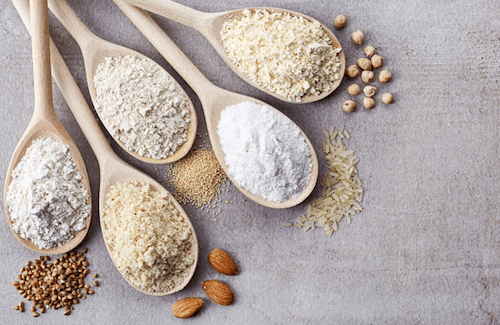It’s slowly becoming chillier and naturally, we might find ourselves peacefully cooped up indoors and wanting comfort foods such as warm bread. There are alternative options for starches that are compliant with our program and are quite yummy! Read below to check them out 🙂
Almond Flour

Almond flour is one of the most popular alternatives to wheat flour and is nutrient-dense as it is made from ground almonds. On top of being low-carb, high-protein, and high-fiber, almond flour is also rich in Vitamin E and manganese which both have antioxidant properties. With a low glycemic index, it also helps with blood sugar control and improved insulin function.
The great thing about using almond flour is that it could be used in a 1:1 ratio to wheat flour. However; because almond flour does not contain gluten, baked products made with almond flour will not have the same airiness compared to their traditional counterparts.
Chickpea Flour

Also known as ‘besan’ in Asia and the Middle East, chickpea flour is also high in protein and fiber like almond flour. It is also abundant in folate and manganese which are crucial for red blood cell production and brain function. Another health benefit of chickpea flour is that it can also combat in against inflammation while boosting immune function by neutralizing acidity from a poor diet which in turn balances our body’s pH levels and prevent cancer cell growth.
When buying chickpea flour, it is important to note if the chickpeas have been roasted beforehand or not. This is because roasted chickpea flour is more flavorful whereas raw chickpea flour may have a slightly bitter note. Regardless, it is quite tasty as it is sweet and highly aromatic. Like almond flour, products baked with chickpea flour may turn out more dense and flat.
Oat Flour

Not only can oats be incorporated for your typical breakfast oatmeal bowl, but they can also be used in the form of flours! Oats are beneficial for heart health as they help lower cholesterol levels which in turn can help with lowering the risk of coronary artery disease. This is because oats contain both soluble and insoluble fiber which help pull cholesterol out of our bloodstream. Furthermore, oats contain a specific soluble fiber called beta-glucan which not only lowers total serum and LDL cholesterol, but also helps increase our perception of satiety .
Oat flour is known for its nutty taste while adding a great chewiness and extra moisture to baked products. Another plus is that it oat flour can also be made at home simply by grinding oats from your local grocery store!
Coconut Flour

Another popular option aside from almond flour is coconut flour, which is made from ground and dried coconut meat. Some benefits of coconut flour are that it is high in fiber, and high in protein, and low in glycemic index. Coconut meat is also abundant in potassium and iron which respectively promote cardiovascular health and optimal red blood cell function.
In comparison to almond flour, coconut flour absorbs more water and therefore yields a softer product with a more mild taste. However, because of its capability of high absorption, it would be best to use coconut flour in conjunction to another flour or self-rising ingredients to obtain the best results when baking.
**Before heading out to your local grocery store to buy any of these flours, please check with your dietitian beforehand as these flours tend to be caloric.



